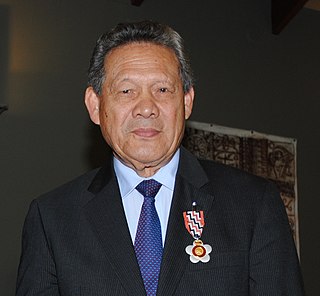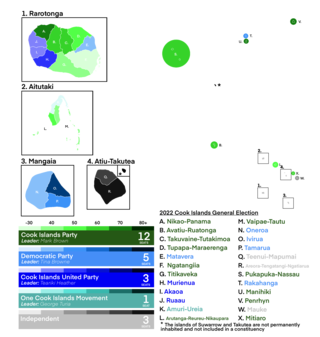
The Cook Islands Party is a nationalist political party in the Cook Islands. It was the first political party founded in the Cook Islands, and one of the two major parties of the islands' politics since 1965.

General elections were held in Fiji between 26 September and 8 October 1966, the last before independence in 1970 and the first held under universal suffrage. The result was a victory for the Alliance Party, which won 23 of the 34 elected seats. Its leader Kamisese Mara became the country's first Chief Minister the following year.

Joseph Williams was a Cook Islands politician and physician who served as Prime Minister of the Cook Islands for four months in 1999. He is credited with having worked to prevent the spread of the tropical disease lymphatic filariasis (elephantiasis). He principally resided in Auckland, New Zealand, where he was medical director of the Mt Wellington Integrated Family Health Centre.

Albert Royle Henry was the first Premier of the Cook Islands and the founder and first leader of the Cook Islands Party (CIP). First elected Premier in August 1965, he was unseated in the aftermath of the 1978 election after an electoral petition found he had committed electoral fraud. He was later stripped of his knighthood. In 2023 he was posthumously pardoned.
Norman George is a Cook Islands politician and former Speaker of the Cook Islands Parliament, Deputy Prime Minister, and Cabinet Minister.

General elections were held in the Cook Islands on 30 March 1983. The result was a victory for the Cook Islands Party (CIP) of Geoffrey Henry, who became prime minister. However, the CIP lost their majority by the end of July, eventually resulting in Parliament being dissolved and new elections called in November 1983.

General elections were held in the Cook Islands on 2 November 1983. The result was a victory for the Democratic Party, which won 13 of the 24 seats. A coalition government was formed with the opposition Cook Islands Party, with Democratic Party leader Thomas Davis as prime minister and CIP leader Geoffrey Henry as deputy prime minister. Henry was later replaced with Terepai Maoate.

General elections were held in the Cook Islands on 30 March 1978 to elect members of the Legislative Assembly. The result was a victory for the Cook Islands Party (CIP) of Premier Albert Henry, which won 15 of the 22 seats. The Democratic Party won the remaining seven seats.

General elections were held in the Cook Islands on 20 April 1965 to elect 22 MPs to the Cook Islands Legislative Assembly. The elections were won by the Cook Islands Party and saw Albert Henry become the Cook Islands' first Premier.

General elections were held in the Cook Islands on 17 November 2010 in order to elect 24 MPs to the Cook Islands Parliament. The elections were won by the Cook Islands Party, which won 16 of the 24 seats. Voter turnout was 78%.
The United Cook Islanders was a political party in the Cook Islands. It was established on 16 February 1968 in order to challenge the then-dominant Cook Islands Party and provide a more organised opposition. The party was organised by David Hosking and Taira Rere. Prominent members included former CIP cabinet ministers Manea Tamarua and Mana Strickland. The party did not initially have a formal leader, though Hosking served as "campaign leader"

General elections were held in the Cook Islands on 11 April 1972. The result was a victory for the ruling Cook Islands Party (CIP), which won 15 of the 22 seats in the Legislative Assembly. The newly formed Democratic Party won seven seats. CIP leader Albert Henry remained Premier.

Early general elections were held in the Cook Islands on 3 December 1974. The result was a victory for the ruling Cook Islands Party (CIP), which won 14 of the 22 seats in the Legislative Assembly with 64% of the vote. The Democratic Party won the remaining eight seats. CIP leader Albert Henry remained Premier.
Te Ariki Terau Mana Strickland BEM was a Cook Island educator and politician. He was the Minister of Education in the first Cook Islands government after self-government was obtained in 1965.

General elections were held in the Cook Islands on 9 July 2014, determining the membership of the 16th Cook Islands Parliament.

Dick Charles Brown was a Cook Islands businessman and politician. He served as a member of the Legislative Assembly between 1958 and 1965, and became the territory's first Leader of Government Business in 1963.

Ngatupuna Matepi (1909–1977) was a Cook Islands politician. He served as a member of the Legislative Assembly from 1958 until his death, had two spells in the cabinet between 1962 and 1965, and became the first official Leader of the Opposition in 1968.

Vainerere Tangatapoto was a Cook Islands chief, educator and politician. He served as member of the Legislative Assembly in two spells between 1958 and 1983.

A by-election was held in the Cook Islands constituency of Avatiu–Ruatonga–Palmerston on 17 May 2017. The by-election was precipitated by the resignation of Albert Nicholas. It was won by Albert Nicholas.

General elections were held in the Cook Islands on 1 August 2022. A referendum on legalising medical cannabis was held on the same day.











